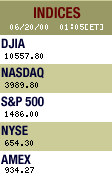| Corporate Financial Healthcare Technology | |
| Stock of the Day Tip of the Day Periscope | |
 for more information | |
|
Honda to boost car output in Britain despite pound's strength
The strategy offers some relief to Britain's battered auto
industry and bucks the trend of Honda's rivals, which have warned
that the pound's strength against the euro has hurt profits.
Honda, Japan's No. 2 carmaker, said Monday it will shift
production of its two-door Civic model to Britain from Japan.
The new investment would create an additional 1,000 new jobs for
Honda, which currently has a British work force of 3,100.
The recent strengthening of the Japanese yen against the pound
would seem to support the argument for redirecting exports to
Japan. But the company has not decided yet whether it will export
any of the new cars back to Japan, spokesman Paul Ormond said.
Britain is Honda's base for exports to Europe, Africa and the
Middle East. Like other British-based carmakers, Honda has felt the
pinch of the unfavorable exchange rate of pounds for euros.
"It is going to be difficult to weather the storm of currency
fluctuations, but we see it as a management function to overcome
that problem,'' Ormond said.
Toyota Motor Corp. on Thursday became the latest company to show
concern about the pound-euro exchange rate when it said it wants
its British parts suppliers to quote prices in euros instead of
pounds.
Unlike Toyota, Honda suggested that it might reroute some of its
exports away from the European market and toward Japan.
"There's a very strong argument for investing (to increase
output) when you get out of the euro-zone,'' said Mark Norman, an
analyst at CAP Motor Research Ltd., a research group headquartered
in the northern city of Leeds.
Honda began building engines at Swindon and shifted to
auto assembly three years later. Its only other facility in Europe
is a small plant in Turkey.
Honda lost $135 million on European sales last year -- its
first-ever loss in the region. However, Ormond said Honda would
continue making cars in Britain.
Germany's BMW blamed the pound's strength against the euro for
the bulk of its losses at the Rover car business. BMW sold Rover in
May.
In June, Japanese automaker Nissan warned that it too might have
to curtail its British investments due to the unfavorable
pound-euro exchange rate.
| ||
|
© , Fox Market Wire. All Rights Reserved Sitemap | Terms |